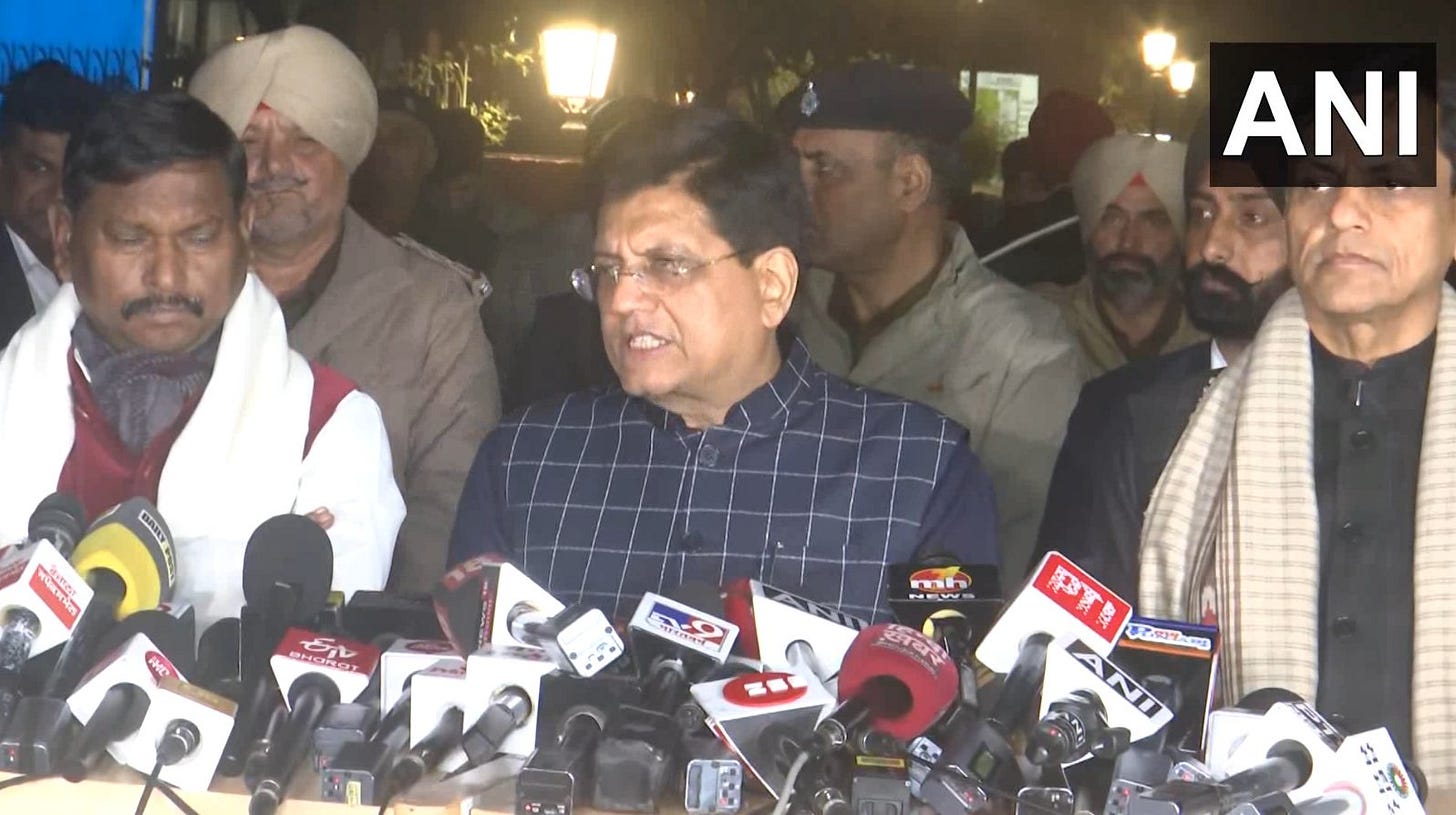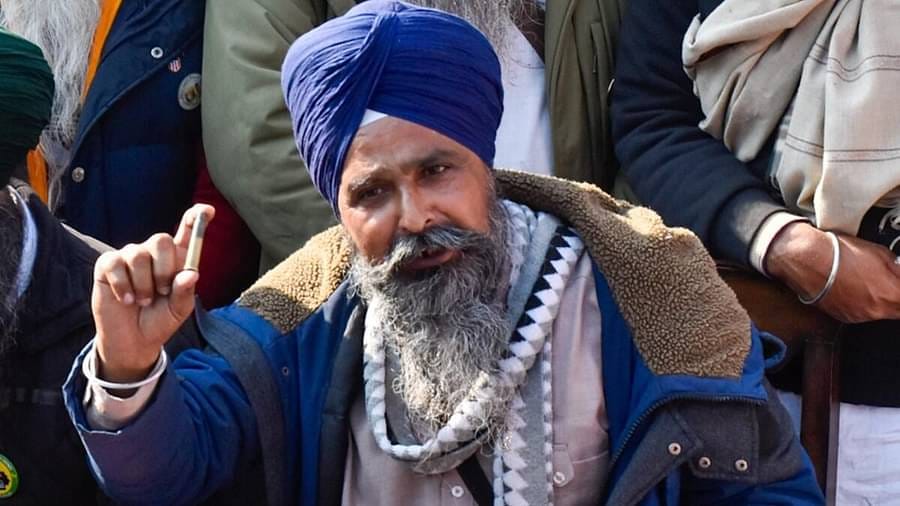GOI's Offer of MSP on 5 Additional Crops to the Agitating Punjab Farmers
The pitfalls that the farmers need to avoid.
Central Government’s Offer of MSP: Stalemate Over?
After the conclusion of the fourth round of negotiations that extended into the early hours of today morning in Chandigarh, the Union Ministers presented a significant proposition to the protesting farmers from Punjab. The marathon session, marking a crucial moment in the ongoing dialogue between the Government and the agricultural community, unfolded against the backdrop of the farmers' steadfast demand for a legal guarantee of the Minimum Support Price (MSP).
A New Ray of Hope in Agricultural Policy?
In a late-night briefing, Minister of Commerce and Industry, Piyush Goyal, articulated the Government's innovative approach to addressing the farmers' concerns. The proposal centred on the procurement of pulses, maize, and cotton by the Government agencies at MSP for a span of five years, contingent upon entering into a contractual agreement with the farmers. "Cooperative societies like the NCCF (National Cooperative Consumers Federation) and NAFED (National Agricultural Cooperative Marketing Federation of India) will engage in contracts with farmers cultivating 'tur dal', 'urad dal', 'masoor dal', or maize to purchase their crops at MSP for the next five years," Goyal elucidated. He emphasized the absence of a cap on the purchase quantity and mentioned the development of a dedicated portal for this purpose.
Implications for Punjab's Agronomy
The Minister underscored the dual benefits of this initiative: safeguarding Punjab's agricultural legacy and mitigating the environmental strain on its land and water resources. The move is seen as a potential game-changer, promising not only to preserve the fertile plains of Punjab from becoming barren but also to alleviate the stress on the dwindling groundwater table.
Land Use and Cropping Pattern
In Punjab, India, agriculture forms the backbone of the economy, with an expansive 41.8 lakh hectares—82% of its geographical area—dedicated to farming. This makes Punjab a key agricultural hub, underpinned by a sophisticated irrigation system that covers 98% of its farmland. The state's extensive use of canals (28%) and tubewells (78%) ensures that nearly all agricultural land is well-watered, supporting its significant agricultural output.
Breaking the Wheat-Paddy Cycle
The cultivation of wheat and paddy, central to Punjab's farming, also presents a challenge to water resource management due to the high water demand of especially paddy, which has led to groundwater depletion. Efforts to mitigate this include promoting crop diversification, with cotton cultivation increasing from 3.92 lakh hectares in 2019 to 5 lakh hectares in 2020, and a rise in maize cultivation. Despite these efforts, sugarcane farming on 96,000 hectares produced significant yields but also highlighted issues such as difficulties in crop lifting, weighment, and payment by sugar mills. This situation exemplifies the ongoing struggle to balance agricultural productivity with environmental sustainability in Punjab.
Farmers' Deliberation and Decisive Steps Ahead
The farming leaders, while cautiously optimistic, have reserved their judgement pending detailed discussions within their communities. Sarwan Singh Pandher, a prominent farmer leader, indicated the scheduling of internal forums on February 19-20 to deliberate on the government's proposal. "We will seek expert opinions and decide our future course of action accordingly," Pandher stated, hinting at the complex interplay of considerations that will guide their decision-making process.
A Pause before the March
With the 'Delhi Chalo' march temporarily suspended, the eyes of the nation are on the potential resumption of this mass mobilization on February 21, should the talks falter in addressing all outstanding issues. The dialogue, which has seen multiple rounds on February 8, 12, and 15, remains a testament to the deep-rooted challenges and aspirations of the Indian agrarian sector.
Our early morning reaction
In a late-night expression of optimism, a significant statement was made regarding the ongoing negotiations between the Central Government and Punjab farmers. At 1:40 AM IST on February 19th, a tweet highlighted the government's proposal for a binding 5-year contract to procure cotton, pulses (three types), and maize at the Minimum Support Price (MSP). Describing the offer as "fair, just, and equitable," the tweet expressed a sincere hope for the proposal's acceptance by the farmers in good faith, aiming to conclude the agitation. The call was for all stakeholders to engage constructively towards the socio-economic development of the agricultural sector, not just in Punjab but across the entire nation. This gesture reflects a broader desire for resolution and progress in the face of prolonged negotiations, emphasizing the importance of dialogue and mutual benefit in addressing the complex challenges of agricultural policy and farmer welfare.
Our unsolicited advice to the Farmer Organizations
In advising the farmers amidst ongoing negotiations, a nuanced appeal was made, urging them to deliberate thoughtfully and engage with their community, stakeholders, and supporters before reaching a decision. The guidance highlighted the importance of caution, specifically advising against being swayed by experts and economists with radical leftist views who lack practical agricultural experience, including never having engaged in farming or trading agricultural produce in markets. These individuals, along with certain trade union leaders, were critiqued for their role in the economic downturn of Punjab's traditional industrial areas, notably in Islamabad, Chheherta in Amritsar, and Batala town, which have suffered significant setbacks.
All factions’ endorsement needed
The call extended to all factions within the Samyukt Kisan Morcha (SKM), including prominent groups like BKU – Rajewal, Ugrahan, and Lakhowal, urging them to unequivocally support the Central Government's latest proposition. Emphasized was the critical need for unity and clear communication, underscoring that the moment was ill-suited for silence, indecision, or internal politics that could undermine a potentially beneficial agreement. The overarching message was a rallying cry for solidarity, wisdom, and leadership to heal divisions and propel Punjab towards a future marked by prosperity and growth.
Beware of Detractors—Navigating Towards Consensus
As the nation moves closer to the Lok Sabha Polls of 2024, with the possibility of the election "Code of Conduct" being implemented at any moment, the broader farmer organizations find themselves at a pivotal crossroads. It is a time marked by the presence of various actors—including discontented politicians, splinter factions of the Kisan Unions, and left-leaning journalists and economists—who seem inclined towards seeing the current negotiations fail. This landscape is fraught with challenges and potential pitfalls that the farmer organizations must navigate with acute awareness and strategic foresight.
In this critical period, it is imperative for these organizations to engage constructively and view the ongoing discussions as a continuous process rather than a one-off event. The urgency of the situation cannot be overstated; accepting a beneficial deal now holds precedence over holding out for an elusive perfect agreement that may never materialize. This juncture calls for the Kisan leadership to demonstrate unparalleled sagacity, unity, and foresight. By seizing this opportunity, they can steer the community towards a more prosperous future, ensuring that the collective voice of the farmers is heard and respected in shaping policies that directly impact their lives and livelihoods. Now more than ever, it is time for the leadership within the Kisan Unions to rise to the occasion, embracing a path that leads to healing, progress, and prosperity for Punjab and its farming community.
Epilogue: Beyond MSP: A Kaleidoscope of Demands
The farmers' demands extend beyond the MSP guarantee, encompassing the implementation of the Swaminathan Commission's recommendations, pensions, debt waivers, equitable electricity tariffs, and justice for past grievances, including pending criminal cases. These reflect a broader quest for dignity, sustainability, and justice within the agricultural framework of India.
As negotiations continue to unfold, the nation watches with bated breath, hopeful for resolutions that bridge aspirations with pragmatic policies, ensuring the prosperity and well-being of its agrarian heartlands. In the meanwhile, it is hoped that this mini-package is accepted, generating goodwill and clearing the path for further progress.





